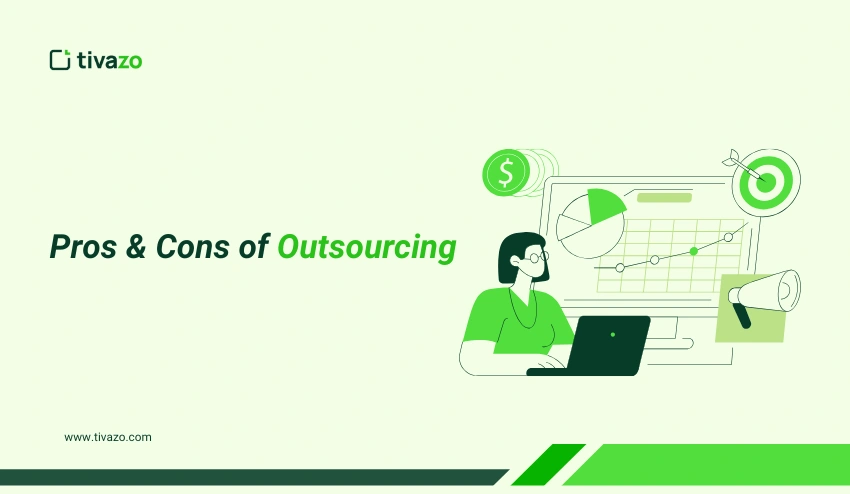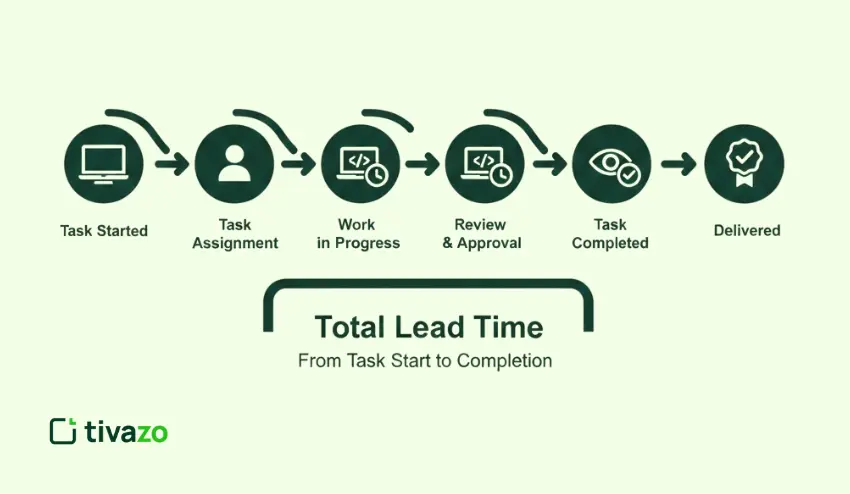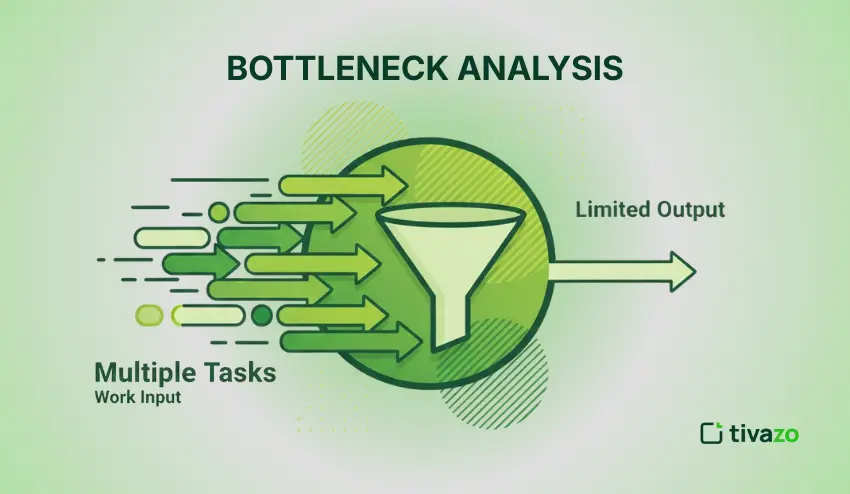Outsourcing has been a popular means to minimize costs, increase efficiency, and acquire expert skills for businesses. Is it the correct step for every company?
The pros and cons of outsourcing should be examined to enable business leaders to make wiser decisions. Business process outsourcing, IT support, HR, and payroll services are all examples of outsourcing that have the benefit of cost-saving, flexibility, accessibility to global talent, but also the risk of loss of control, third-party dependency, and possible communication risks.
Whether you are planning to offshore outsource or outsource accounting services or even healthcare IT solutions, it is important to know both the pros and cons of outsourcing. The benefits and pitfalls of outsourcing are very clear, and by weighing them properly, companies can streamline their operations, increase productivity, and stay competitive in a rapidly globalizing world.
What is outsourcing?
Outsourcing is a business practice where companies hire external service providers to handle specific tasks or functions instead of managing them in-house. This may be IT support, payroll, HR, accounting services, or healthcare IT. Outsourcing is a phenomenon of choice by many businesses to cut down operational costs, acquire specialized skills, and enhance efficiency.
The most common are offshore outsourcing, business process outsourcing, and specialized service outsourcing, which enable businesses to devote time to their core business and benefit by using the expertise and capacity of outsiders. Partnering with the global service providers, organizations will be in a position to scale rapidly, remain flexible, and competitive in a fast-changing marketplace.
Pros and Cons of Outsourcing
Pros of Outsourcing
1. Cost Savings
Cost savings are one of the greatest positives of outsourcing. Outsourcing services such as payroll, IT support, or even accounting services will also enable businesses to cut down on operational costs and have access to skilled professionals without necessarily having to employ them full-time.
2. Access to Expertise
Outsourcing also presents specialized skills that may not be in-house. In whatever it is, healthcare IT, business process outsourcing, or IT support, outside providers have the skills, tools, and experience that enhance overall business performance.
3. Flexibility and Scalability
The other positive effect of outsourcing is greater flexibility and scalability. Firms can ramp up activities and then ramp down without making a long-term commitment and incurring overhead costs that would be accrued by hiring permanent employees. This is particularly beneficial in areas like managed IT support, where businesses can easily scale services up or down based on evolving technical demands.
Cons of Outsourcing
1. Reduced Control
One of the greatest losses of outsourcing is the loss of control over outsourced activities. Organizations can have a hard time with quality control, timeliness, and adherence when other firms take charge of important functions such as human resources or information technology.
2. Communication Challenges
Outsourcing, especially offshore, may pose a communication challenge because of time differences, language, and/or cultural differences. Such obstacles may impact the workflow, teamwork, and the efficiency of the project.
3. Dependency on External Providers
The high reliance on outsourcing may leave a company vulnerable to third-party suppliers. Any interference, technical breakdown, or cancellation of the contract by the provider can affect the business continuity and efficiency of the business operations to a great extent.
Pros and Cons of Outsourcing Overseas
Pros of Outsourcing Overseas
1. Cost Efficiency
Cost efficiency is one of the key advantages of overseas outsourcing. By outsourcing, companies can enjoy the cheaper labor rates in other nations and still produce high-quality output in services such as IT support, customer care, or even accounting.
2. Access to Global Talent
Outsourcing abroad makes available to a business a large talent pool. This can be specialized IT skills, healthcare IT expertise, or business process outsourcing, and companies can utilize knowledge and experience that is not locally available.
3. Round-the-Clock Operations
The other benefit of outsourcing overseas is the capacity to have 24-hour operations. The time difference can also be used to keep tasks such as customer service and IT support running even when local business is closed, thus enhancing efficiency and responsiveness.
Cons of Outsourcing Overseas
1. Cultural and Language Barriers
The major drawback of offshore outsourcing is the possibility of cultural and language barriers. Miscommunication or misunderstanding may affect the timeline of the project, the quality, and the cooperation of teams.
2. Time Zone Challenges
When outsourcing abroad, it may also be necessary to work across time zones. Although this may be advantageous in 24/7 operations, it may also lead to delays in communication, approvals, and project management.
3. Security and Compliance Risks
Outsourcing to foreign countries can bring about security and compliance issues. Businesses should also be sure that the overseas partners adhere to the data protection requirements and are capable of keeping confidential even concerning sensitive work, such as payroll or healthcare IT services.
Pros and Cons of Offshoring and Outsourcing
Pros of Offshoring and Outsourcing
1. Reduced Operational Costs
Among the greatest advantages of offshoring and outsourcing is the fact that it results in a massive decline in operational expenses. Companies can also outsource their business processes, like IT support, payroll, or accounting services, to offshore vendors and save on salaries, office space, and employee benefits. The benefits of outsourcing to other parts of the world are that it enables companies to redirect their savings to other areas of strategic growth and still produce quality outputs.

2. Access to Specialized Skills
Outsourcing and offshoring provide businesses with a great variety of specialized skills and advanced technology that are not available in-house. Whether it is healthcare IT solutions providers, IT support providers, or business process outsourcing, external providers have technical expertise and industry knowledge that can be used to increase productivity, streamline operations, and improve business performance.
3. Scalability and Flexibility
The other big advantage of offshoring and outsourcing is the possibility to expand operations fast and effectively. Businesses can either expand or reduce the outsourced services to meet project requirements, seasonal increase or decrease in workload, or market expansion. Such elasticity enables businesses to sustain their competitive edge, ensure efficient operations, and keep up with the trends in the global business without the burden of a permanent workforce.
👉You May Also Like: Offshoring vs Outsourcing – Business Strategy
Cons of Offshoring and Outsourcing
1. Communication Barriers
One of the major drawbacks of offshoring and outsourcing is the language barrier. Time zone differences, language barrier, and cultural differences may bring misunderstandings, delays, and workflow inefficiency. Organizations should invest in project management tools, effective communication channels, and frequent updates to curb these issues and ensure effective collaboration with foreign teams.
2. Quality Control Issues
There is also the possibility of quality control problems arising as a result of outsourcing and offshoring. The external providers might not be operating on the same standards or practices as the company, and this can impact the deliverables, like the IT support or accounting services, or even healthcare IT solutions. To ensure quality, one should monitor the performance, assess quality, and have clear expectations with third-party providers.
3. Dependence on Third Parties
The other con is the possible reliance on third-party suppliers. When the outsourced firm experiences operational hitches, technical breakdowns, or contractual problems, it can directly affect the business continuity of the client. Businesses ought to create alternative plans and more than one vendor in case the risks of overreliance on offshore outsourcing are to be minimized.
Pros and Cons of Outsourcing HR
Pros of Outsourcing HR
1. Cost Efficiency
Cost-effectiveness is one of the primary benefits of outsourcing HR. Outsourcing of human resources activities like recruitment, payroll management, and benefits administration helps firms to save a lot of expenses incurred in hiring, training, and maintaining an in-house human resources department. Outsourcing HR gives companies the opportunity to redirect resources towards core business and focus on growth as the HR processes are handled in a professional and efficient manner.
2. Expertise and Compliance
HR Outsourcing gives you access to expert labor laws, compliance, and employee management knowledge. Outsourced HR services keep abreast with the employment laws and best practices in the industry, thus eliminating legal risks and keeping the company in compliance with both local and international standards. The experience enables organizations to concentrate on the main operations of the business and leave the complicated procedures to the professional HR services.
3. Focus on Core Activities
The other important advantage of outsourcing HR is the fact that it allows one to concentrate on core business activities. By outsourcing administrative duties like payroll, employee onboarding, and benefits administration, businesses can have more time and resources to focus on strategic efforts like business development, innovation, and customer outreach. This will result in increased productivity, and the HR functions will be effectively handled by third-party providers who are experienced.
Cons of Outsourcing HR
1. Loss of Control
One of the most important cons of outsourcing HR is that you lose control over the processes inside the company. When HR departments outsource important HR functions, organizations can be less likely to influence policies, employee engagement, and organizational culture, which may impact satisfaction and alignment of the workforce with company values.
2. Confidentiality Risks
Outsourcing HR entails the sharing of confidential information about the employees with third-party providers. This poses a threat to confidentiality and data security. Organizations have to make sure that their HR outsourcing firms adhere to high standards of data protection and have a secure system to manage employee data.

3. Limited Personalization
External HR providers may not fully understand the unique needs and culture of the organization. This can result in less personalized HR services, such as employee engagement programs, performance management, or benefits customization, which may not align perfectly with the company’s internal practices.
Pros and Cons of Outsourcing Payroll
Pros of Outsourcing Payroll
1. Time Savings
Outsourcing payroll also saves companies time by outsourcing complicated processes such as the calculation of salaries, the deduction of taxes, and the reporting of compliance. This enables the internal staff to concentrate on strategic initiatives as opposed to the routine administrative tasks.
2. Accuracy and Compliance
Outsourced payroll services guarantee the proper work and compliance with local taxation and labor requirements, reducing the chances of mistakes and legal complications. This professional management enhances reliability and minimises financial risks.
3. Reduced Administrative Burden
Outsourcing payroll relieves companies of routine administrative work like producing payslips or employee benefits. This simplifies the way things are done and makes them more efficient for the organization.
Cons of Outsourcing Payroll
1. Dependency on Provider
Using a third-party payroll provider can render the companies vulnerable to external systems that may be risky in case of technical difficulties or service outage.
2. Data Security Concerns
Outsourcing payroll means exchanging sensitive financial and employee data, and this presents a risk associated with data security and data privacy.
3. Lack of Flexibility
External payroll services can be less receptive to oddball requests or last-minute modifications, and this can cause a business to be slow to implement unique payroll adjustments.
Pros and Cons of Offshore Outsourcing
Pros of Offshore Outsourcing
1. Lower Costs
Offshore outsourcing helps to cut down operational and labor expenses due to the availability of services in countries where salaries are lower. This enables businesses to deploy resources to other growth and strategic projects and still retain quality.
2. Global Talent Access
Companies have access to a wide range of talent in terms of IT support, customer support, or specialized business processes. Outsourcing abroad introduces expertise that might not be easily found locally.
3. 24/7 Operations
The time zone variations allow 24-hour operations to enhance customer service, project schedules, and business stability. This will provide a faster response and increased efficiency in international markets.

Cons of Offshore Outsourcing
1. Communication Challenges
Across time zones and languages, misunderstandings and delays in the execution of a project may occur. The proper cooperation involves the establishment of systematic communication and control tools.
2. Cultural Differences
A variation in work culture, ethics, and business practices may also influence workflow and team alignment to the extent of reducing efficiency.
3. Regulatory Risks
Outsourcing offshore may include compliance and legal issues related to do with data protection, privacy, and labor laws, which should be well addressed.
Pros and Cons of Outsourcing Accounting Services
Pros of Outsourcing Accounting Services
1. Cost Savings
Outsourcing accounting services saves the cost of in-house accountants and overhead expenses and is a cost-effective method for businesses of all sizes. It also enables smaller firms to have access to professional financial services that they would not be able to afford.
2. Expertise Access
External accounting services have a wealth of knowledge on taxation regulations, auditing, and financial reporting, and thus maintain compliance and precision in financial management. Such professional knowledge assists the companies in preventing costly errors and keeping abreast of the changes in regulation.
3. Focus on Strategic Goals
Outsourcing of accounting functions enables companies to concentrate on their core business strategies as the accounting functions are professionally handled. This will make sure that the management has more time to focus on growth, innovation, and customer engagement.
Cons of Outsourcing Accounting Services
1. Security Risks
When dealing with sensitive financial information, sharing it with third-party providers may raise security and privacy issues unless the right measures are implemented. Businesses must make sure that their accounting partners are completely adhering to the high standards of data protection.
2. Reduced Control
Firms can exert very little control over the accounting procedures, which may influence the reporting schedules and internal financial disclosure. It may also complicate the processes of making immediate changes or adjustments where necessary.
3. Possible Misalignment
Outsourced accounting teams do not necessarily know the company-specific processes and priorities, which may result in gaps in financial management. Constant communication and clear expectations are required to stay in sync.
Conclusion
Knowing the pros and cons of outsourcing is vital to any company that is planning to outsource some tasks or functions. The obvious benefits of outsourcing include cost reduction, access to expertise, flexibility, and scalability in the areas of human resources, payroll, information technology support, and healthcare IT.
Nevertheless, it is also associated with risks, such as a lack of control, communication issues, risks of data security, and third-party provider reliance. Companies can extract the maximum out of outsourcing and mitigate the risks by closely analyzing their functions to outsource and ensuring that the partners they choose are reliable. Finally, strategic outsourcing enables companies to concentrate on the core business and improve efficiency, as well as staying competitive in the global world.




